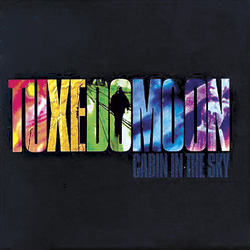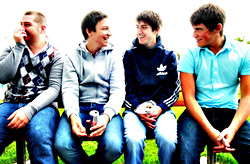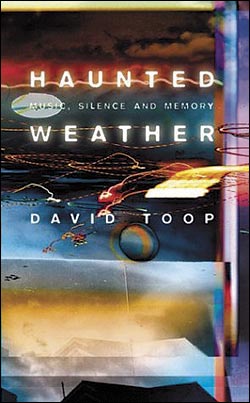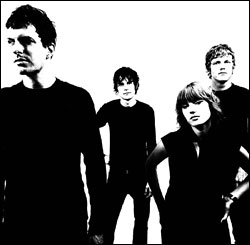Whatever deity plopped Tuxedomoon into late-20th-century America either fucked up miserably or pulled off a brilliant stroke of creative miscasting. Wrong place, wrong time(s), wrong dimension—hell, even making San Francisco circa 1978 the band’s birthplace was a cruel joke, offering them a whiff of their ideal fast and fucked-up homeland, tainted by the knowledge that they’d never be bigger than Boz Scaggs. No wonder their late-’70s releases radiate a discomfort that hints at existential hives.
So do the ’80s ones—recorded after the band relocated first to New York, then Brussels—just slightly more than recently released Cabin in the Sky (Crammed), their first studio album since 1989’s You. Now living in Mexico City, New York, and Greece, respectively, core members Steven Brown, Peter Principle, and Blaine Reininger seem but a wee bit more happily homeful than they did playing themselves in Glenn O’Brien’s crypto-documentary Downtown 81, a film that situated their classically informed, synth-, string-, and woodwind-enhanced cabaret pop alongside complementarily jittery offerings from then–kindred spirits James White and the Blacks and DNA.
Only their lyrical thrust has softened. Opener “A Home Away” begins with a broad-shouldered bass line—Principle has practice at providing extra density and momentum for the drumless ensemble. (When they need ’em, they usually turn to machines. And they don’t need ’em all that often.) “Be strong/Be blasé/Know your place at home, away,” Brown suggests in the song’s most substantial stanza, his noble declamation floating over Principle’s anchor, a few scraps of scratchy guitar, and the occasional down-and-dirty flourish from Belgian trumpeter Luc van Lieshout, a member of the band since the mid-’80s.
Such sober advice is new ground for Brown, whose travelogues used to focus on drugs, boys, and/or the difficulty of maintaining properly lighthearted social relationships. “Everyone is too friendly, too well-dressed, too polite, too serious,” he complained in the midst of a party on 1981 landmark Desire‘s “Victims of the Dance.” “YOU’RE TOO SERIOUS!”
Reininger certainly isn’t, especially when he plays lecherous foil to his lofty bandmate. “It’s old Count Dracula/I’ll take you to the backula,” he slavers like a cross between Tom Waits and one of Tex Avery’s wolves on the chorus of “Baron Brown.” “Of a feast we will partake/A meal of you I’ll make.” Talk about maturing! He never could have mugged so well back when his voice resembled that of a David Bowie less given to choking on high notes.
Sadly, some of Reininger’s lyrics suggest that he’s hoping to open a Margaritaville branch in Athens, as when he croons, “I’ve got five pairs of shoes/And my cup runneth over/All my stitches are in time/And I am receivin’ more than nine” on “Here Till X-Mas.” What? Is this some kind of coded seduction scheme, as if Peter Cetera’s wife is going to hear the song and be like, “Shoes, stitches, and a deep voice. Hmmm . . . “? Given Reininger’s previous forays into science fiction, bitter reflection, and mordant social commentary, there’s absolutely no good reason for the singer to fly the lyrical equivalent of a Hawaiian shirt tied to a fishing rod.
Unless he’s just putting one over on the Yanks—a sport the band practiced even before they left the country. After all, one of their few forays into straight-ahead rock, the 1978 surf-punk freakout “No Tears,” featured sometimes-member Winston Tong bleating, “No tears for the creatures of the night/No tears for the creatures of the night/My eyes are dry/G’bye” (as well as the rest of the song’s lyrics) with a very deliberate Elmer Fudd accent. Given the band’s exotic sense of humor, it’s not out of line to suggest that Cabin in the Sky— the title itself—harbors some kind of complex joke: The handle was first affixed to Vincente Minelli’s directorial debut, a 1943 musical comedy with a mostly black cast, starring Eddie Anderson (“Rochester” of Jack Benny fame) as “Joe.” Might the appropriation be an oblique reference to Tuxedomoon’s long-standing, disembodied alter ego, first referenced on 1978’s “Joeboy the Electric Ghost”?
Maybe yes, maybe no. Surely one of the only bands in the world with a film-maker in its roster (San Francisco pal Bruce Geduldig—also credited with backing vocals on Cabin—has been a touring member for ages), Tuxedomoon’s manifest fascination with cinema dates back to “James Whale,” from 1981 debut album Half Mute.
As with that mournfully sinister tribute to Frankenstein‘s director—and countless other B-sides and album tracks—much of the best stuff on Cabin is instrumental. “Annuncialto” rides a concise, melodic bass continuum, with lush, Martin Denny–esque piano and counterbalancing melodica afloat in a sea of heavily processed guitar, Reininger’s violins and Brown’s clarinet gamboling like sea rabbits through the stew. Dreamier still, “Cagu Five-0” visits a realm not far from the undead cowpoke turf Earth explored on last year’s Hex—albeit far more colorfully, van Lieshout’s muted trumpet and Brown’s massed saxes playing tag with tremolo-enhanced electric guitar and otherworldly piano.
Even on the album’s most mundane tracks (see “Here Till X-Mas”), the band play the “otherworldly” card often and well, trailing filaments of ectoplasmic noise into the mix like souvenirs from the Great Beyond. It’s the album’s secret glue and Tuxedomoon’s fountain of youth. They’ve no lack of the latter; like contemporaries Wire and Sonic Youth, they’ve aged awfully gracefully, the absolute elsewhere they’ve been seeking for nearly 30 years still just outside their hungry grasp—thank Joeboy!








